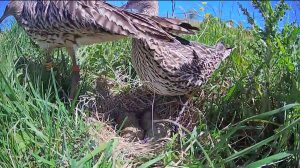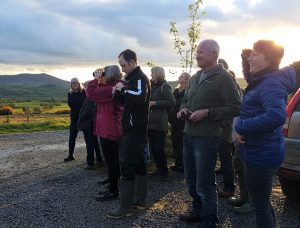Blog by Amanda Perkins, Curlew Country Project Manager
 Juliet Bailey and Mike Smart from the Severn Vale project have noticed that the male is doing long stints of duty on the nest. Curlew Country ornithologist Tony had observed that sometimes this male can sit for 10 hours overnight and is certainly doing most of the incubation so far. The revelation initiated a few anthropomorphic WhatsApp’s among the small Curlew Country team.
Juliet Bailey and Mike Smart from the Severn Vale project have noticed that the male is doing long stints of duty on the nest. Curlew Country ornithologist Tony had observed that sometimes this male can sit for 10 hours overnight and is certainly doing most of the incubation so far. The revelation initiated a few anthropomorphic WhatsApp’s among the small Curlew Country team.
Both male and female Curlew take turns at incubating the eggs which will take about 28-30 days until the chicks hatch. Hours of duty and changeover times can differ between pairs. Whilst one bird is incubating the other is feeding, resting, but also often acting as a guard bird. In past years we have heard the partners away from the nest calling in alarm as they rise to fend off potential avian predators, often crows.
Curlew Cam has been an interesting experience for Curlew Country. We wanted to help raise awareness of the plight of Curlew, but we have also learned a lot from close observation of the incubating birds. The different low nest calls which we had only heard adults make to chicks as opposed to one another previously. We had not previously observed that birds would fly straight from the nest unless in a situation of alarm.
We had always hoped to analyse our 4 years of Curlew Cam footage, but simply not had time. Each year we get many calls from others with Curlew on their land or wanting to start a project asking us for help and advice. Last year it was one or two per day during the season. A number of these queries have related to changeover times.
This year, one of our new volunteers offered to analyse the footage (thank you Liz) and we are looking forward to what may be revealed. We rely on volunteers to help us, not just our wonderful farming and land managing partners, but also the inspirational stalwarts who turn out each year to help and the new arrivals who contact us each year wanting to get involved. We could not operate without the fantastic generosity of their spirit and time.


Jswhitehead@hotmail.com
We at staying at Tallebudgera Tourist park Gold Coast. There is a curlew right next to our van which has apparently been sitting on the nest since around 26 November. We have tried to do things on the van without upsetting the battery rd on the nest plus the partner who stays close by. They are making almost like a train noise and occasionally they flap their wings. We hope not to be upsetting them.
Hi Jan,
Sounds like you have a bush stone curlew (Burhinus grallarius), rather than an Eurasian curlew. I’m not qualified to comment on this species, but as with all nesting birds it is best to keep your distance and limit disturbance as much as possible while they are nesting. It sounds like you are already doing that, so well done! We work exclusively with Eurasian curlew which is a threatened species in Europe and Asia. There is also another species of stone curlew (Burhinus oedicnemus) that breeds in south-east England, which look very similar to yours and are closely related!
Hope this helps!